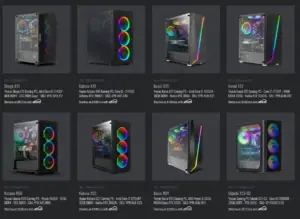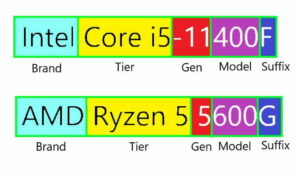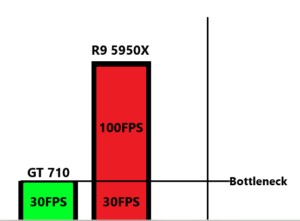Because of inflated GPU prices a lot of folks who may have otherwise been shopping for top-tier GPUs like the RTX 3080 are left looking for mid-range cards like Nvidia’s GeForce RTX 3060 and RTX 3060 Ti. Obviously the 3060 Ti outperforms its non-suffixed sibling, but which offers the better value? In this article we’ll answer this question in practical terms by looking at how these two cards perform in-game.
Pricing
First things first, let’s take a look at cost, as this is typically the limiting factor when shopping for new hardware.
The truth is, by the time this piece is written the market will have changed. Even so, we’ll try to provide an accurate representation of the going rate for both the RTX 3060 and 3060 Ti. As always, we recommend shopping around before pulling the trigger, especially when dealing with expensive components like video cards. Prices given below factor in shipping. Since we’re solely interested in gaming performance, LHR models (those with a reduced mining hashrate) will be treated as equal to standard SKUs.
The cheapest RTX 3060s available currently hover around the $800 mark. These include MSI’s Ventus LHR, Gigabyte’s Eagle WindForce LHR, and Colorful’s iGaming LHR makes.
Meanwhile, RTX 3060 Ti AIBs start at around $915 (note that this is the downsized ITX version with only one fan). Most of the cheaper standard-sized models including MSI’s Ventus LHR, Asus’ Dual LHR, and Gigabyte’s Eagle OC 3060 Ti’s cluster around the $950 mark.
In general, then, the RTX 3060 Ti costs approximately 19% more than the standard 3060. For the 3060 Ti to be considered a good value offering, then, it will need to outperform the 3060 by at least this margin, preferably more.
See Also: The Best Power Supplies for the RTX 3060 and RX 6600XT
Performance Benchmarks
Now, let’s look at how the RTX 3060 and RTX 3060 Ti stack up against each other in real, in-game performance at resolutions of 1080p, 1440p, and 4K. All benchmarks were recorded on high/ultra settings by Random Benchmark. Values used were recorded without DLSS or RTX enabled, unless otherwise specified.
1080p
| Game | RTX 3060 Average FPS | RTX 3060 Ti Average FPS | RTX 3060 Ti Advantage |
|---|---|---|---|
| Assassin's Creed: Valhalla | 71 | 79 | +11.2% |
| Valheim | 114 | 147 | +28.9% |
| Cyberpunk 2077 | 60 | 78 | +30.0% |
| COD: Warzone | 126 | 159 | +26.2% |
| Hitman 3 | 119 | 154 | +29.4% |
| Red Dead Redemption 2 | 71 | 84 | +18.3% |
| DIRT 5 | 84 | 110 | +31.0% |
| Watch Dogs: Legion | 61 | 79 | +29.5% |
| Minecraft (RTX Enabled) | 54 | 73 | +35.2% |
| Rainbow Six Siege | 291 | 364 | +25.1% |
As demonstrated, the RTX 3060 Ti dominates in 1080p, with an average FPS advantage over the 3060 of 26.5%. As this upgrade only costs 19% more, the 3060 Ti is the clear winner.
If you only care about attaining consistent 60FPS performance, however, the RTX 3060 is still a viable option. As long as you don’t enable ray tracing the base 3060 should make the mark in any game, even at high graphical settings.
1080p Winner: RTX 3060 Ti
1440p
| Game | RTX 3060 Average FPS | RTX 3060 Ti Average FPS | RTX 3060 Ti Advantage |
|---|---|---|---|
| Assassin's Creed: Valhalla | 58 | 65 | +12.1% |
| Valheim | 74 | 103 | +39.2% |
| Cyberpunk 2077 | 38 | 49 | +28.9% |
| COD: Warzone | 91 | 115 | +26.4% |
| Hitman 3 | 77 | 103 | +33.8% |
| Red Dead Redemption 2 | 56 | 69 | +23.2% |
| DIRT 5 | 67 | 90 | +34.3% |
| Watch Dogs: Legion | 47 | 61 | +29.8% |
| Minecraft (RTX Enabled) | 33 | 45 | +36.4% |
| Rainbow Six Siege | 188 | 243 | +29.3% |
In 2160 x 1440p the results are much the same: The RTX 3060 Ti wins by a wide 29.3% margin. What’s even more critical is its ability to hit the 60FPS mark in almost all games; aside from CyberPunk 2077 (a notoriously GPU-hostile title) and RTX-enabled Minecraft, the 3060 Ti averaged above 60 frames per second in all tested titles. The 3060 was only able to hit this mark in half of them.
This makes the 3060 Ti a substantially better 1440p card than the generic 3060.
1440p Winner: RTX 3060 Ti
4K
We won’t be detailing 4K benchmarks for either of these cards, since neither of these is adequate for 4K gaming in most titles. 60FPS is the minimum standard and even the RTX 3060 Ti can’t achieve steady 60FPS performance in 4K at maxed settings in the majority of games. Consider an RTX 3070 or 3080 if you’re bent on playing in UHD with an Nvidia GPU.
Final Verdict
It should come as no surprise that the RTX 3060 Ti will be crowned victor in this matchup. It’s priced incredibly well (compared to the general market, of course) considering the power it offers, and it’s a great choice for anything up to 1440p 60FPS.
While the 3060 may have been shown up, it’s still a better choice in some scenarios. Think of it this way: If you’re not going to use the additional juice the 3060 Ti offers, why pay extra for it?
Say, for instance, you just want to run games at 1080p at 240FPS and you don’t care all that much about graphical quality. The standard 3060 is perfect for this application so there’s really no reason to spend $150 on a suffix. Weigh these options using the provided information and your specific needs, and make a decision accordingly.
How to Pay Less for an RTX 3060 or 3060 Ti
If you’re only upgrading your GPU, you’re probably best off going the traditional route and buying just the card. If you’re upgrading your whole system or considering building/buying a new one, you might be able to save money by opting for a prebuilt PC.
For example, a prebuilt rig like HP’s Pavilion TG01-2260xt costs $930 when configured with an RTX 3060, and $1130 with an RTX 3060 Ti. This is a fully-built PC with an Intel Core i5-11400, 8 gigs of RAM, and a 256GB NVMe, and the entire build costs less than the market price of just the graphics card.
This is one of the best deals we’ve found, but many prebuilt models are far cheaper than the sum of their parts’ market value. Some other similar builds with the RTX 3060 or 3060 Ti include:
- HP Pavilion TG01-2285t (Core i7-11700K, RTX 3060, 16GB RAM, 256GB NVMe SSD, 2TB HDD)
- SkyTech Azure (Core i5-10400, RTX 3060 Ti, 16GB RAM, 1TB NVMe SSD)
- HP Pavilion TG01-2176z (Ryzen 7 5700G, RTX 3060, 16GB RAM, 512GB NVMe SSD, 1TB HDD)
- Lenovo Legion 5i (Core i7-11700F, RTX 3060, 16GB RAM, 512GB NVMe SSD, 1TB HDD)
Shop around and you’ll probably find a couple of rigs that are cheaper or nearly as cheap as the card alone.
Art of PC is reader-supported. We may earn a commission if you make a purchase through one of our affiliate links. Thanks for your support!




